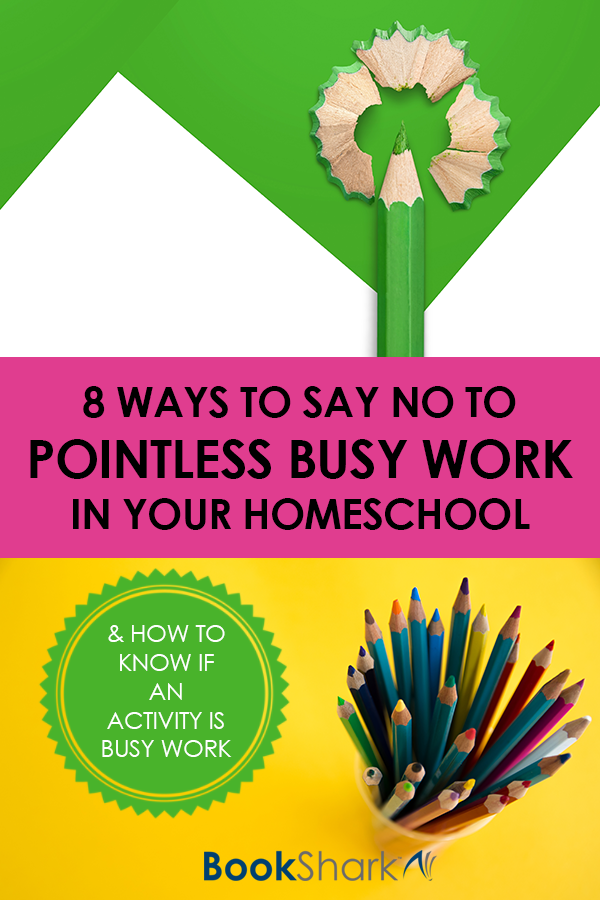




8 Ways to Say No to Pointless Busy Work in Your Homeschool

If you’ve ever doubted yourself as a homeschooler, you’re not alone. No matter how many years we homeschool, doubt can get loud. Seeds of doubt plant germinate and sprout when our kids struggle, when we’re tired, when our kids say they are bored, or when learning stagnates. When worry rears its head, our inclination might be to turn to a quick fix or busy work to quiet our fears.
What is busy work? Busy work is anything we tell ourselves is good for our child knowing full well deep inside it’s a way to keep kids occupied or put a bandaid on whatever is going on.
Busy work often appears in the form of
- worksheets you’ll never look at or use
- excessive practice and problems
- crafts
- online learning games
- educational television
- flashcards, and workbooks
While all of these things can be wonderful learning tools if used as such, they can also be pointless. They can be busy work.
Busy work in education is like the fillers in our food. We can pretend something labeled natural is automatically nutritious. But when we analyze the ingredients label, we see the truth. And at times (especially when we are stressed or exhausted), we tell ourselves our children are learning when children are merely doing something school-like.
I’m not here to judge. When I was a new teacher, I gave my students busy work. Again, there are a variety of reasons good teachers and homeschoolers use busy work to keep kids occupied. Busy work keeps kids quiet and basically content when other children are learning at different paces, when children are struggling to learn, when a teacher is tired or overwhelmed, and when there isn’t time to plan a more meaningful or hands-on lesson.
Good teachers and homeschoolers don’t turn to busy work because we’re lazy. We turn to it because we feel something is amiss. When we have that feeling, we need to answer the deeper questions:
- Is my child struggling or challenged by something we are learning?
- Is my child complaining about being bored or miserable?
- Am I comparing my child to someone else?
- Am I tired or in need of a break?
- Is my child tired or in need of a break?
- Are my expectations realistic?
- Am I looking for reassurance?
All of these questions point to something other than the need for busy work. And in fact, offering worksheets or mundane practice on something a child already knows, finds boring, or they don’t understand is only going to make the situation worse.
There are alternatives to busy work, even when we’re tired or feel overwhelmed. Here are eight ways to say no to busy work.
1. Play
Children learn through play! Play is just as important, if not more so than anything we are teaching our kids. Rest assured, they are learning! If you need to work one on one with a child, have toys or activities the others can play with independently. Maybe set up an art station, reading corner, or building center. These areas do not have to be complicated or time-consuming to set up. Pull out beads and strings, watercolor pencils and paper, put books in a basket, or grab a bin of LEGO blocks.
2. Games
There are countless games that offer practice in reading, writing, math, geography, etc. Children will learn the skills at a faster rate if they are playing. Bonus: playing a game can be the perfect way to both take a break and learn at the same time.
3. Quiet Times

If we want our children to learn, our children need rest. A study out of the University of Edinburgh and the University of Missouri looked at the best ways to improve memory. “The participants were asked to listen to some stories and answer questions an hour later. Without the chance to rest, they could recall just 7% of the facts in the story; with the rest, this jumped to 79% – an astronomical 11-fold increase in the information they retained.”
When our kids aren’t used to resting or playing quietly by themselves, it can take time to help them adjust. Start out with ten minutes of quiet play and work your way up.
4. Use Group Work or Pair/Share
We can learn by watching others. If there are skills you want your children to practice, find a friend or sibling they can practice with. The other child may explain the concepts in a new way that helps it stick.
5. Read
As long as you’re reading high quality books, reading is never busy work. Read with your child, to your child, listen to an audiobook together, or have a child read silently.
6. Focus on What is Going Well
We all need reassurance, but as homeschoolers, we may have to offer it to ourselves. Keep lists, charts, or bullet journals to remind yourself you are all doing great! Keep track of and encourage yourself by focusing on all the things your child accomplishes during a school day.
7. Take a Break
Give yourself and your child time to process everything you’re doing. Take time to plan, to talk together about what your child wants to learn or needs to learn.
8. Go Outside
There are a number of reasons to get kids outside. The outdoors offers places to learn, explore, and exercise. Nature is good for our brains and our well being. Take a walk or head to the creek, the fresh air will reset everyone’s mood and your kids will find all sorts of learning threads to follow.
As homeschoolers, we have the opportunity to offer our children a quality education over quantity. Our kids do not have to sit in chairs all day, stand in lines, or wait for twenty other children to finish their work. We can set deadlines or not. Our kids can learn inside or out, in the morning or afternoon, and while that doesn’t mean our job as a homeschooler is easy, it does mean we can focus on what our children need and avoid keeping them busy with pointless busy work.

If after reading this article, you wonder if your entire curriculum may be based on busy work, take a look at BookShark. Meaningful discussions about great books are the heart of a BookShark education. No fluff. No busy work. Request a catalog here.
About the Author
Kelly left teaching middle and high school English to homeschool her children and reclaim how she and her family spent their time. Followers of interest-led learning, her family’s days rarely look the same, but they tend to include a lot of books, art supplies, and time outside.
Kelly facilitates local writing circles for women and children and blogs about nurturing the love of learning on her blog, Curiosity Encouraged. She loves to journal, read memoirs, hike, and travel. She seeks quiet mornings and good coffee daily.
